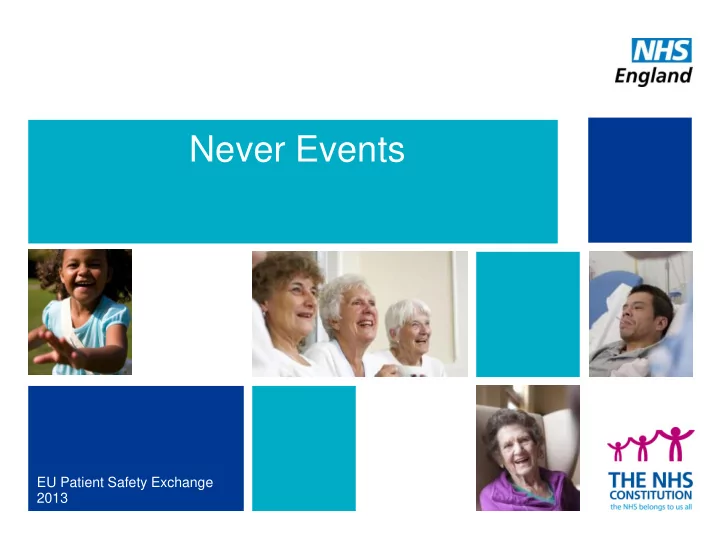

Never Events EU Patient Safety Exchange 2013
Definition • Never Events are defined as serious, largely preventable patient safety incidents that should not occur if the available preventative measures have been implemented by healthcare providers. 2
Criteria • The incident has clear potential for or has caused severe harm/death • There is evidence of occurrence in the past i.e. it is a known source of risk • There is existing national guidance and/or national patient safety recommendations on how the event can be prevented and support for implementation • The event is largely preventable if the guidance is implemented • Occurrence can be easily defined, identified and continually measured 3
Framework for Never Events • 2009/10 – a list of 8 Never Events developed by the National Patient Safety Agency (NPSA) in collaboration with key stakeholders • 2010/11 – core list of 8 Never Events refined with changes to two of them: The definition of Wrong Site Surgery now applies from the start of any operation Retained instrument post operation – includes retained surgical swab • 2011/2012 – expanded list of 25 Never Events developed by the Department of Health (DH) 4
Current list of 25 Never Events 1. Wrong site surgery 2. Wrong implant/ prosthesis 3. Retained foreign object post operation 4. Wrongly prepared high risk injectable medication 5. Maladministration of potassium - containing solutions 6. Wrong route administration of chemotherapy 7. Wrong route administration of oral/enteral treatment 8. Intravenous administration of epidural medication 5
Current list of 25 Never Events cont’d 9. Maladministration of insulin 10. Overdose of midazolam during conscious sedation Opioid overdose of an opioid – naive patient 11. 12. Inappropriate administration of daily oral methotrexate 13. Suicide using non collapsible rails 14. Escape of a transferred prisoner 15. Falls from unrestricted windows 16. Entrapment in bedrails 17. Transfusion of ABO incompatible blood components 6
Current list of 25 Never Events cont’d 18. Transplantation of ABO or HLA incompatible organs 19. Misplaced naso or oro gastric tubes 20. Wrong gas administered 21. Failure to monitor and respond to oxygen saturation 22. Air embolism Misidentification of patient’s 23. Severe scalding of patient’s 24. 25. Maternal death due to post partum haemorhhage after elective caesarean section 7
Five Never Events excluded from death/severe criteria • Wrong site surgery • Wrong implant/ prosthesis • Retained foreign object post operation • Wrong route administration of chemotherapy • Inappropriate administration of daily oral methotrexate 8
Implementation of the expanded list • Concept is now familiar – used in the NHS since 2009 • Providers inform patient and family concerned that a serious incident has occurred according to the ‘Being Open’ policy • Commissioners and providers determine if the incident fits the criteria for a Never Event • Commissioners and providers determine a process to follow when a Never Event occurs 9
Implementation of the expanded list con’t • Providers report the incident following the National Framework for Reporting and Learning from Serious Incidents Requiring Investigation • Providers carry out an analysis of the underlying root cause of the event and discuss learning and preventative action with their commissioner 10
Never Event related to NG Tubes 19. Misplaced naso- or oro-gastric tubes Death or severe harm due to a misplaced naso- or oro-gastric tube being used where the misplacement of the tube is not detected prior to commencement of feeding, flush or medication administration. Where appropriate checks are conducted and documented and demonstrate that the tube is in the correct place, but the tube is subsequently found to have become misplaced, for example after becoming dislodged, provided there has been regular checking of tube placement, this is not a never event. Setting: All healthcare premises. Guidance: - Patient safety alert – Reducing harm caused by misplaced nasogastric feeding tubes, 2005, available at http://www.nrls.npsa.nhs.uk/resources/?entryid45=59794 - Patient safety alert – Reducing harm caused by misplaced naso and orogastric feeding tubes in babies under the care of neonatal units, 2005, available at http://www.nrls.npsa.nhs.uk/resources/?entryid45=59798&q=0%c2%acnasogastric%c2%ac - Reducing the harm caused by misplaced naso-gastric feeding tubes in adults, children and infants, 2011, available at http://www.nrls.npsa.nhs.uk/resources/?entryid45=129640&p=2 - Harm from flushing of naso-gastric tubes before confirmation of placement, 2012. available at http://www.nrls.npsa.nhs.uk/resources/?entryid45=133441 11
Never events reported to SHAs and the NRLS in 2011/12 Never Event Number of never events Number of Incidents flagged as never reported to SHAs 2011/12 events in the NRLS 2011/12 Wrong site surgery 70 41 Wrong implant/prosthesis 41 15 Retained foreign object post-operation 161 86 Wrongly prepared high-risk injectable medication 0 0 Maladministration of potassium-containing solutions <10 <10 Wrong route administration of chemotherapy <10 0 Wrong route administration of oral/enteral treatment <10 0 Intravenous administration of epidural medication 0 0 Maladministration of Insulin <10 0 Overdose of midazolam during conscious sedation <10 0 Opioid overdose of an opioid- naïve Patient 0 0 Inappropriate administration of daily oral methotrexate <10 <10 Suicide using non-collapsible rails 0 0 Escape of a transferred prisoner <10 0 Falls from unrestricted windows <10 <10 Entrapment in bedrails 0 0 Transfusion of ABO-incompatible blood components <10 0 Transplantation of ABO incompatible organs as a result of error 0 0 Misplaced naso- or oro-gastric tubes 23 15 Wrong gas administered 0 0 Failure to monitor and respond to oxygen saturation 0 0 Air embolism <10 <10 Misidentification of Patients <10 0 Severe scalding of Patients 0 0 Maternal death due to post partum haemorrhage after elective caesarean section 0 0 Total 326 163 12
Recommend
More recommend